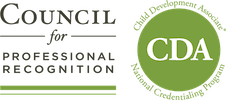
SPONSORED BLOG
Whether you’re embarking on professional development (PD) to meet state requirements, or you want to invest in your own growth, PD has a number of benefits.
First, it helps ensure you’re keeping up with the latest trends, techniques and skills. It also makes you more marketable as an employee, helps you become a better colleague and opens the door to career advancement. Finally, and most importantly, it helps you become a better educator for your students.
At ChildCare Education Institute, we’ve spent the past 20+ years providing early childhood educators like you with the professional development courses you need to grow and succeed. As a result, we know a thing or two about how to make the most of your PD endeavors.
Here are our top tips for getting the most out of your professional development:
Set clear objectives (write them down)
When you set clear objectives, it gives you something to work toward. With everything else on your plate, a well-defined plan can give you a roadmap to follow and help keep you on track along the way.
As you set your goals, make sure to physically write them down so you can easily refer them as needed. This will help you visually see what you want to achieve — and will improve your chances of succeeding.
Finally, it’s important to ensure the goals you set for yourself are realistic and achievable. To do that, we recommend following the SMART goal-setting system.
Choose courses that interest you
A lot of times, people don’t know where to begin with their professional development. The easiest way to get started is by choosing courses that interest you. Perhaps you read an article about mindfulness and it intrigued you (in the case of CCEI, we offer The Value of Mindfulness in Early Childhood Settings). By selecting a topic that interests you, you’ll likely be more interested in the content and motivated to complete the course.
Choose courses that challenge you
While courses that appeal to you will likely be more enjoyable, don’t forget to also pick topics that might seem more challenging. It’s important for you to stretch yourself – it will also make you a more well-rounded educator. This can mean selecting a course that is completely new to you (for example, engineering in early childhood) or something that has always been a challenging area for you.
Find a partner
Finding a study buddy is helpful because the two of you can tackle tough concepts together, quiz each other and most importantly, hold each other accountable. Once you’ve found a partner, we recommend either setting aside time to work through your courses together or creating regular check-ins to see how the other is doing on the goal path.
Avoid distractions
With everything going on in your world – work, family obligations, errands, etc. – it’s easy to get sidetracked. Don’t let distractions interfere with the time you set aside for studying. If possible, find a quiet space in your home that you can turn into a study nook. If that’s not possible, try to find a public place to work, like a library or a quiet coffee shop. Using the Pomodoro Technique (focusing for 45 minutes and then taking a break for 15) can also help you stay focused on and plugged into your coursework.
Reward yourself
The knowledge you gain from professional development and the ways it can advance your career should be reward enough, but no one said you can’t provide a little extra incentive for yourself. Whenever you complete a course or achieve a goal, treat yourself. This might be taking yourself out to breakfast, watching a movie or a couple of episodes of your favorite television show guilt-free or enjoying an at-home spa day.
Keep your learning journey going
Once you’ve knocked out your state-required professional development hours (or you’ve met the goals you’ve set for yourself), keep the learning going by working toward your college degree from home. Thanks to our partnership with StraighterLine, you can now access five ECE-focused courses from anywhere — and then transfer the credits you earn from them to over 1,500 partner colleges and universities.

